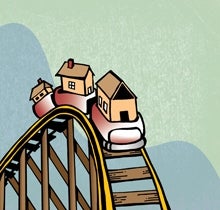Here’s what your real estate broker won’t tell you: Home prices still have a way to fall before hitting the much sought after “bottom.”
That’s because the enormous gap between home prices and income levels — fueled by easy access to cash and subprime loans during the market’s peak — has only just begun to narrow.
In fact, the median single family home price in Massachusetts was six times the state’s median household income in 2007, according to an examination of data by the Worcester Business Journal.
Economists and real estate experts say that home prices will have to come down to meet income levels, meaning improvement in the local real estate market could be farther down the road for Bay State residents.
The Numbers
The story in 2008 was much the same as in 2007. The median single family home price last year was $305,000, an 11.6 percent decrease from the $345,000 median price recorded in 2007, according to Boston-based real estate tracker The Warren Group. The 2008 median income data for Massachusetts residents won’t be released by the state until August. But if income levels stayed on track (which they most likely won’t due to the economy) the average 2008 salary of a Bay State resident would be $60,135.
Based on those numbers, a simple calculation shows that home prices in 2008 were more than five times income levels. That huge multiple between salary and home value offers a glimpse into why the current real estate market freefall is more severe and may last longer than those in the past.
In the late 1980s, the last time the real estate market became noticeably inflated, median home prices in Massachusetts never exceeded 4.71 times the median income. (Click here to see the graph for home prices over the last 20 years.)
A return to the kind of stability seen in the 1990s requires either wages to rise in relation to home prices or home prices to fall in relation to wages. And considering the state of the local and national economy, which was worn threadbare by the fattening residential real estate market, continued falling home prices may be the more likely.
Mark LaMountain, vice president and mortgage loan officer at Commonwealth National Bank in Worcester, said mortgage loan underwriters are predicting home price declines of about 5 percent per year “and they don’t know when it’ll bottom out.”
There are other indications that home prices have quite a way to go to reach bottom, despite being less expensive and more affordable than they’ve been in five years.
During the second week of April, the Mortgage Bankers Association reported that the number of mortgage applications fell by 11 percent in its first decrease in more than four weeks.
This, even as mortgage rates continue to drop. During the same week, the average rate on a 30-year fixed home loan was 4.7 percent.
At the same time, foreclosure activity continues, threatening to drive prices down still further.
However, the home price-to-income ratio may be closer to stability, Alan Clayton-Matthews, a University of Massachusetts economist, said in an e-mail to the WBJ.
But determining whether that’s true is difficult because price declines have been so inconsistent among different regions of the state. For example, home prices in Worcester have declined dramatically, while in more well-to-do suburbs such as Southborough they’ve dropped much less.
Weak employment growth and weak income growth mean that to get back to some form of stability, the home price-to-income ratio, which in Massachusetts was much higher than in the rest of the country during the boom, must continue to fall.
In a forecast early this year, Clayton-Matthews said house prices are expected to fall through the first half of 2010. When the decline stops, it is expected that home prices will have declined, on a seasonally adjusted quarterly basis, by 21 percent from their peak in the third quarter of 2005.
Prices are then expected to remain flat through 2011 and begin to rise by about 5 percent in 2012.
The one bright spot in all this? Massachusetts may no longer be quite as expensive. “This fall to historically low levels should repair much of the cost-of-living disadvantage that Massachusetts has had in the last several years,” Clayton-Matthews said.

